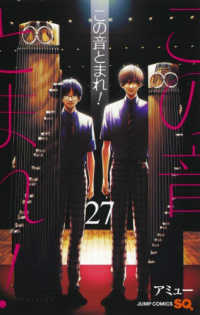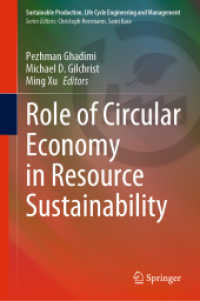- ホーム
- > 洋書
- > 英文書
- > Politics / International Relations
Full Description
The 2011 general election in the Republic of Ireland, which took place against a backdrop of economic collapse, was one of the most dramatic ever witnessed. The most notable outcome was the collapse of Fianna Fáil, one of the world's most enduring and successful parties. In comparative terms Fianna Fáil's defeat was among the largest experienced by a major party in the history of parliamentary democracy. It went from being the largest party in the state (a position it had held since 1932) to being a bit player in Irish political life. And yet ultimately, there was much that remained the same, perhaps most distinctly of all the fact that no new parties emerged. It was, if anything, a 'conservative revolution'.
A Conservative Revolution? examines underlying voter attitudes in the period 2002-11. Drawing on three national election studies the book follows party system evolution and voter behaviour from boom to bust. These data permits an unprecedented insight into a party system and its voters at a time of great change, as the country went through a period of rapid growth to become one of Europe's wealthiest states in the early twenty-first century to economic meltdown in the midst of the international Great Recession, all of this in the space of a single decade. In the process, this study explores many of the well-established norms and conventional wisdoms of Irish electoral behaviour that make it such an interesting case study for comparison with other industrialized democracies.
Contents
Michael Laver: Foreword
Editors' Preface
1: Michael Marsh, David M. Farrell, and Gail McElroy: Introduction: The 2011 Election in Context
2: James Tilley and John Garry: Class Politics in Ireland: How Economic Catastrophe Realigned Irish Politics Along Economic Divisions
3: Kevin M. Leyden and Michael S. Lewis-Beck: The Economy and the Vote in Irish National Elections
4: Patrick Bernhagen and Heinz Brandenburg: Voting Through Boom and Bust: Information and Choice at Irish General Elections, 2002-2011
5: Gail McElroy: Party Competition in Ireland: the Emergence of a Left-Right Dimension?
6: Shaun Bowler and David M. Farrell: The Lack of Party System Change in Ireland in 2011
7: Cees van Der Eijk and Johan A. Elkink: How Generational Replacement Undermined the Electoral Resilience of Fianna Fáil and Facilitated its 2011 Electoral Meltdown
8: Robert Thomson: The Malleable Nature of Party Identification
9: Michael Gallagher and Jane Suiter: Pathological Parochialism or a Valuable Service? Attitudes to the Constituency Role of Irish Parliamentarians
10: André Blais, Carol Galais, and Theresa Reidy: In the Line of Duty: The Moral Basis of Turnout in the 2011 Irish Election
11: Michael Marsh: After 2011: Continuing the Revolution
12: Eoin O'Malley and R. Kenneth Carty: A Conservative Revolution? The Disequilibrium of Irish Politics
Appendix: The INES 2011 Questionnaire








